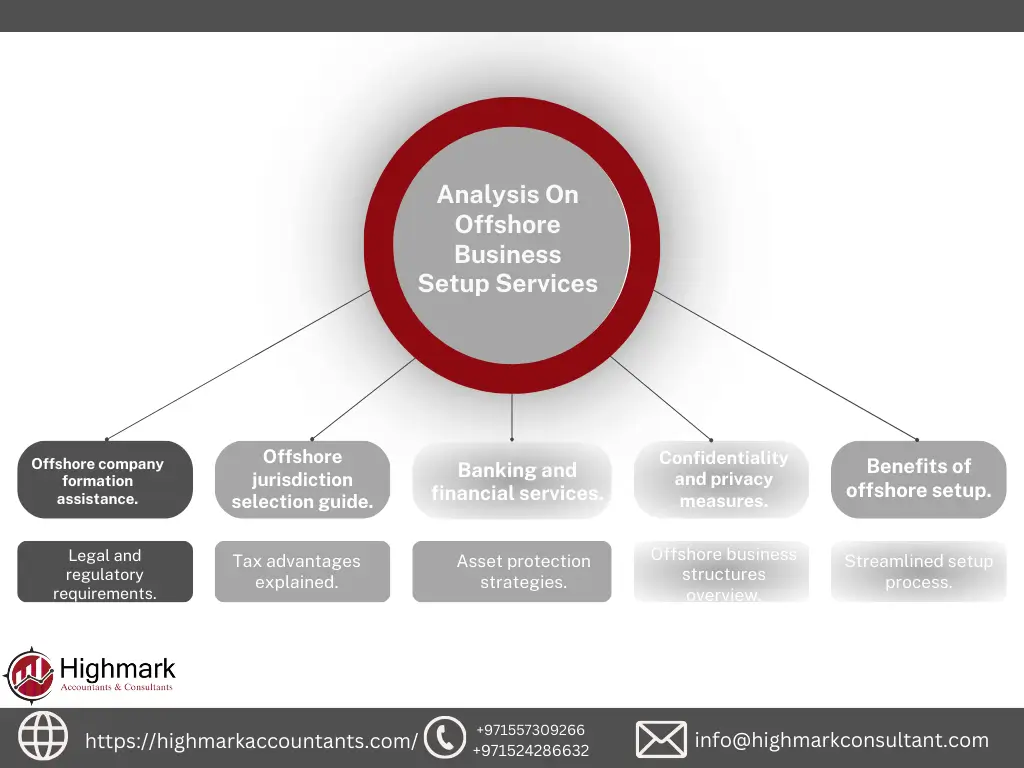Offshore Company Formations Future Trends: What Global Entrepreneurs Should Watch
Wiki Article
Debunking Offshore Firm Formations: How They Run and What to Anticipate
Offshore firm formations can seem complex and enigmatic. Offshore Company Formations. These entities, usually established for tax advantages and privacy, operate under one-of-a-kind legal structures. Business owners might discover themselves steering via a maze of policies and compliance needs. Understanding the details is vital for success. What are the actual benefits? What are the possible challenges? A closer exam discloses the subtleties that could influence decision-making substantiallyComprehending Offshore Firms: Definitions and Kinds
Offshore business are entities established in a territory beyond an individual's or organization's main country of house, commonly for purposes associated to tax optimization, possession security, or regulative benefits. These firms can take various kinds, consisting of minimal obligation firms (LLCs), worldwide organization firms (IBCs), and offshore trusts. Each kind offers certain features and attract different demands.Restricted liability business provide owners with security from personal obligation, while global company companies are popular for their adaptability and very little coverage requirements. Offshore trust funds, on the various other hand, are utilized mostly for estate planning and possession defense.
The option of territory significantly affects the company's operations, as some places offer more positive lawful frameworks and personal privacy defenses. Offshore Company Formations. Comprehending the distinctions between these types is essential for individuals and businesses thinking about overseas frameworks, as each option brings various effects for governance and conformity
The Advantages of Developing an Offshore Company
Establishing an offshore business can provide numerous advantages, particularly for those looking for to enhance their monetary methods and safeguard their possessions. One substantial benefit is tax optimization; numerous jurisdictions use favorable tax prices or exceptions, enabling services to preserve even more earnings. Additionally, offshore companies can give a layer of privacy, shielding the identifications of owners and shareholders from public analysis.Another advantage is asset security. By putting possessions in an overseas entity, individuals can safeguard their riches from prospective lawful cases or political instability in their home countries. This framework also promotes worldwide service procedures, making it possible for less complicated access to worldwide markets and diverse clientele.
The establishment of an overseas business can improve trustworthiness and stature, appealing to clients who value international organization techniques. Overall, these advantages make overseas business formations an appealing alternative for companies and individuals aiming for financial development and protection.
Secret Factors To Consider Before Creating an Offshore Entity
Before developing an overseas entity, numerous important variables should be assessed. Lawful compliance requirements, tax obligation ramifications and benefits, in addition to jurisdiction option, play a significant function in the decision-making procedure. Recognizing these factors to consider can assist organizations and people browse the intricacies of offshore company formations effectively.
Legal Compliance Requirements
When taking into consideration the formation of an offshore entity, comprehending legal compliance demands is necessary to guarantee adherence to both international and local legislations. Possible entrepreneur have to acquaint themselves with regulations controling firm registration, reporting obligations, and functional criteria in the selected territory. This includes verifying the legal needs for directors and shareholders, along with making sure conformity with anti-money laundering (AML) and know-your-customer (KYC) guidelines. In addition, services ought to stay conscious of any type of licensing needs certain to their market. Involving neighborhood legal and financial specialists can provide important insights, ensuring that all necessary documents is prepared and sent correctly. Ultimately, comprehensive understanding of legal compliance aids minimize dangers and fosters a sustainable offshore operation.Tax Obligation Effects and Benefits
Many entrepreneur think about the tax obligation implications and benefits of forming an offshore entity as a vital consider their decision-making process. Offshore firms can provide substantial tax obligation benefits, such as lowered business tax prices, exception from specific regional tax obligations, and the ability to postpone tax obligations on international income. These benefits can cause improved earnings and capital, making offshore frameworks appealing for international service operations. Additionally, the potential for tax treaties may additionally decrease tax obligations. Nevertheless, it is necessary for entrepreneur to comprehend the intricacies included, consisting of compliance with both international and local tax obligation guidelines. Engaging with tax obligation specialists is a good idea to navigate these ins and outs effectively and ensure excellent tax preparation methods.Jurisdiction Choice Factors
What variables should one consider when choosing a jurisdiction for overseas business formation? Key factors to consider consist of tax effectiveness, regulatory atmosphere, and political security. Jurisdictions with desirable tax routines can considerably affect success. The regulative landscape must supply versatility and ease of compliance, enabling effective organization operations. Political security is crucial, as it ensures the security of assets and connection of operations. Additionally, the credibility of the jurisdiction can influence client trust fund and organization partnerships. Ease of access to financial services and the availability of specialist support solutions are additionally vital. Comprehending regional legislations pertaining to coverage, ownership, and personal privacy demands is vital to ascertain that the overseas entity straightens with the service proprietor's goals and lawful obligations. Possession The Refine of Establishing an Offshore Firm Establishing up an overseas firm includes a series of strategic steps that require careful planning and conformity with worldwide guidelines. A specific need to choose an appropriate territory that lines up with their business goals and provides favorable tax obligation advantages. Following jurisdiction option, the next step is to select an unique business name and prepare the necessary paperwork, including articles of unification and investor contracts.When the paperwork is prepared, it should be sent to the relevant authorities in addition to the called for charges. After authorization, the company will get a certification of consolidation, officially developing its legal existence. The specific should then open a company bank account to assist in economic purchases.
Lastly, keeping an overseas business entails adhering to ongoing conformity requirements, such as annual coverage and tax obligation commitments, which differ by territory. Understanding each step is vital for a successful offshore firm development.

Regulatory and legal Framework for Offshore Business
While establishing an offshore important link firm can provide substantial benefits, it is important to navigate through the intricate lawful and regulative structure that controls such entities. Each territory has its own set of laws that dictate whatever from business formation to taxation and compliance requirements. These guidelines are created to stop prohibited activities, such as money laundering and tax obligation evasion, and usually require comprehensive documents and transparency.Trick aspects of this framework consist of the need of assigning neighborhood directors, preserving an authorized workplace, and sticking to annual reporting responsibilities. Additionally, many territories impose particular licensing demands for specific business tasks. Comprehending these legal stipulations is crucial for ensuring compliance and mitigating dangers linked with charges or legal disputes. Involving with legal specialists that specialize in overseas firms can help in steering through this elaborate landscape, eventually promoting a effective and certified offshore service operation.
Typical Misunderstandings Regarding Offshore Companies
Many individuals hold false impressions about offshore companies, often corresponding them with tax obligation evasion and illegal activities. Nonetheless, it is necessary to identify that these entities can run legitimately within a structure created for legitimate organization techniques. Clearing up the lawful condition of overseas firms can aid resolve these misconceptions and promote a much more exact understanding of their objective.Tax Obligation Evasion Myths
Regardless of the growing appeal review of overseas firms, mistaken beliefs concerning their usage for tax obligation evasion linger. Many people mistakenly believe that establishing an offshore entity is exclusively a way to avoid tax obligations. Overseas companies are typically utilized for genuine purposes, such as property protection, international business development, and investment diversity. The assumption that all offshore activities equate to illicit tax evasion forgets the intricacies of international tax obligation guidelines and compliance needs. In addition, the vast bulk of overseas territories have implemented measures to fight tax obligation evasion, advertising openness and information exchange. This mischaracterization can deter genuine services and financiers from exploring the potential advantages of offshore firm formations while continuing an adverse stigma bordering these entities.Lawful Standing Clarified
The legal standing of offshore companies is often misinterpreted, leading to a range of misunderstandings. Numerous believe these entities run in a lawful grey location, presuming they are inherently unlawful or unethical. In truth, offshore business are reputable businesses created under the legislations of particular territories, designed for various reasons, including asset protection and market expansion. An additional common false impression is that offshore business avert taxes entirely; however, they go through the guidelines and tax obligations of their home nations. In addition, some people assume that overseas business can be conveniently made use of for money laundering or unlawful tasks. While abuse can happen, most jurisdictions implement stringent compliance and openness legislations to alleviate such threats, making certain that offshore business operate within lawful frameworks.
Handling and Running Your Offshore Company Successfully
Successfully managing and operating an overseas company calls for a calculated approach that balances compliance with neighborhood guidelines and the pursuit of company goals. Effective offshore monitoring involves comprehending the territory's tax obligation regulations, reporting needs, and operational regulations. Using local specialists, such as accountants and legal experts, can supply vital understandings right into going across these anonymous complexities.In addition, establishing clear interaction networks and operational procedures is essential for keeping efficiency. Using technology for task monitoring and cooperation can enhance performance, while normal efficiency reviews guarantee alignment with calculated objectives.
Furthermore, maintaining robust economic documents is necessary, as openness promotes count on with stakeholders and follow global criteria. Being versatile to changes in regulation or market problems permits overseas firms to pivot successfully, guaranteeing long-term sustainability and growth. By adhering to these concepts, business proprietors can make best use of the advantages of their overseas ventures while mitigating threats.
Frequently Asked Concerns
Just how much Does It Price to Maintain an Offshore Company Yearly?
The cost to preserve an offshore firm each year varies significantly, normally ranging from $1,000 to $5,000, depending on territory, services required, and conformity obligations. It is important to take into consideration added fees for details demands.Can I Open Up a Bank Account for My Offshore Firm From Another Location?
Opening a bank account for an overseas business from another location is typically possible. Nonetheless, needs might vary by jurisdiction, commonly necessitating paperwork and verification procedures, which can make complex the remote application experience for people.Exist Specific Nations Recognized for Easier Offshore Business Formations?
Certain countries, such as Belize, Seychelles, and the British Virgin Islands, are renowned for their structured procedures and desirable regulations concerning overseas business developments, attracting business owners seeking effectiveness and confidentiality in company operations.
What Kinds of Organizations Are Finest Suited for Offshore Firms?
Particular businesses, such as shopping, consultancy, and financial investment companies, usually gain from offshore business due to tax advantages, privacy, and regulative flexibility - Offshore Company Formations. These entities typically prosper in territories that promote positive service environmentsJust How Can I Guarantee Conformity With Local Regulations When Running Offshore?
To ensure compliance with neighborhood laws when running offshore, it is necessary to engage legal experts, conduct comprehensive research on territory laws, and maintain transparent monetary documents, therefore decreasing dangers connected with non-compliance.
Report this wiki page